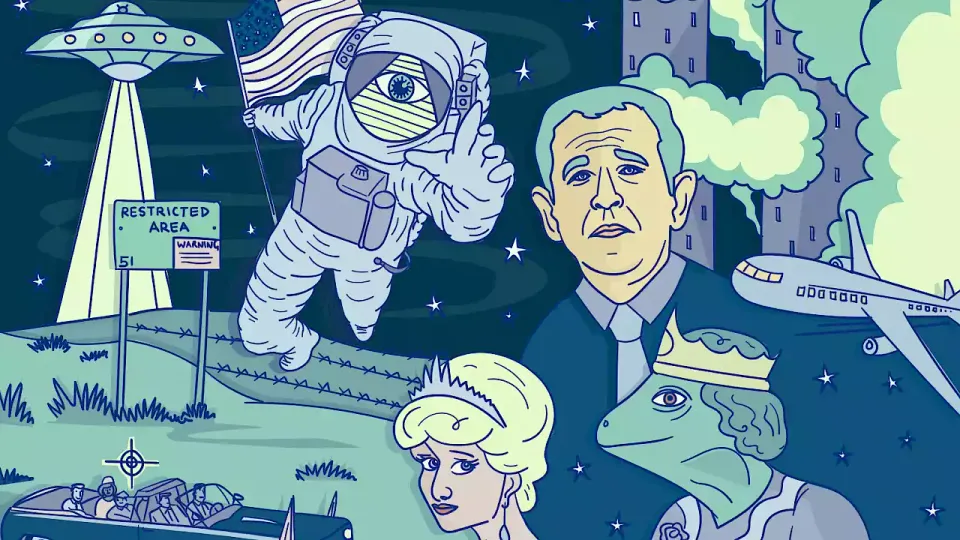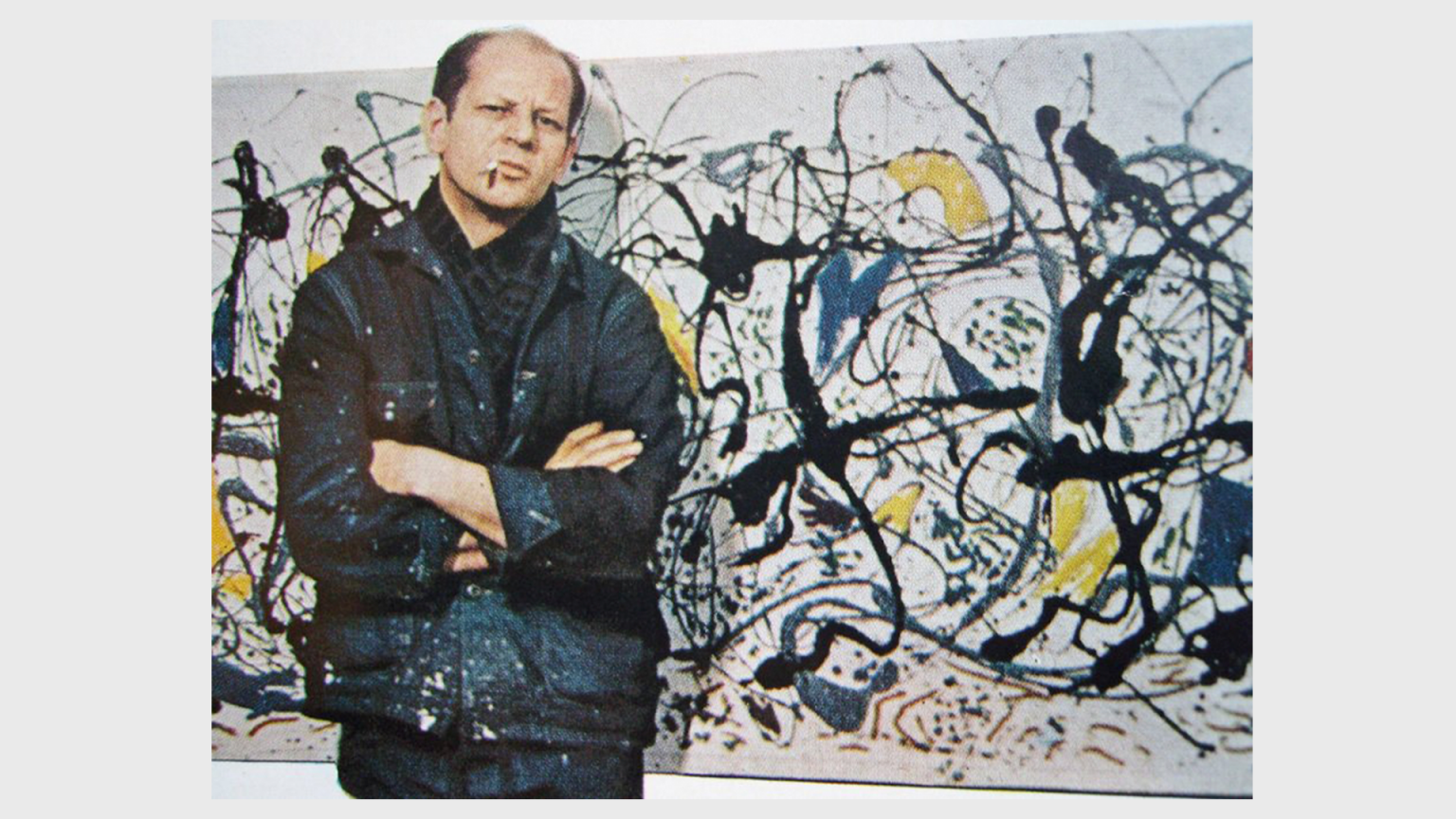Critical thinking for conspiracy theorists?

In recent years, it has been suggested that we live in a post-truth era. According to this view, fake news and conspiracy theories are only symptoms of a culture in which few people really care about truth or the ways to seek it. Critical thinking education would offer a way out of this zeitgeist, for example by defending against ‘fake news’ (Horn & Veermans, 2019) or combating against conspiracy theories (Roulet, 2020). Indeed, given the shaky reasoning that’s behind your typical conspiracy theorizing, it makes intuitive sense that improving critical thinking would help. But do we really know what makes conspiracy theories popular? Are there specific intellectual skills one should target to get rid of irrational conspiracy theorizing? Let’s take a dive into what are currently thought to be the psychology and reasoning processes of conspiracy theorists.
As has been mentioned before on this blog, critical thinking is a container concept holding both skills and attitudes. Teaching critical thinking means teaching analytical thinking, argumentation, perspective-taking, creative thinking, metacognition and deliberative skills. And all of this rides on the back of substantive knowledge — for example, arguments based on the most recent research in cognitive neuroscience are often stronger if the reasoner has domain-specific knowledge about cognition, neuroscience or both. Are any of these skills especially weak among people who are prone to subscribe to conspiracy theories? Do they lack the world knowledge that is necessary to reason properly?
One of the first things that was noticed when surveying the general population on their beliefs in well-known conspiracy theories, was a puzzling pattern in their beliefs. It turned out belief in one conspiracy theory predicts belief in another, even if that other conspiracy theory is unrelated to (and sometimes even in contradiction to) the first one (Goertzel, 1994). For example, a conspiratorial reasoner may believe Osama bin Laden is still alive, but also that he was already dead when the United States came to raid his hideout. This pattern was labelled a monological belief system — as opposed to a dialogical one — and it opened up a way to get a measure of conspiracy thinking: just count the amount of theories any individual (strongly) subscribes to. Later, this particular way of counting was replaced by counting ‘conspiracist worldview’ elements (Brotherton et al., 2013). The resultant score is known as conspiracist ideation.
Such a scoring method has value, but also comes with limitations. One can find traits that correlate with high conspiracy scores, such as paranoid ideation (Barron et al., 2014), trait schizotypy (March & Springer, 2019), intuitive thinking (Swami et al., 2014) or a need for cognitive closure (Leman & Cinnirella, 2013). However, this only shows that overall, people who are deep into many of the elements of a conspiracy worldview are more likely to have these traits. It is unclear whether this can help to understand an individual who might be invested deeply into a single conspiracy theory, but who does not score highly on the conspiracy questionnaires.
This latter group may, however, be of great interest. Sociological field work has suggested that events in the conspiracy scene are frequented by a diverse group of conspiracy theorists, in terms of both social position and worldview (Harambam & Aupers, 2017). The same body of work also describes how groups can condense around singular conspiracy theories, studying solely the World Trade Center collapses or the link between vaccines and autism. There is interdisciplinary tension between the sociological and psychological studies of conspiracy theorists, as the groups identified in field work may not be detected by the deep-rabbit-hole psychological scoring system mentioned earlier. In fact, given the high prevalence of belief in conspiracy theories, with for example Birtherism and 9/11 conspiracies polling at around thirty percent in their heyday (Uscinski & Parent, 2014), there is plenty of reason to believe that the more pathological accounts of conspiratorial ideation are the result of a selection bias.
There is interdisciplinary tension between the sociological and psychological studies of conspiracy theorists.
Those caveats aside, if experimental manipulations lead to changes in conspiracist ideation, that is of interest to understand the cognitive processes that underlie conspiratorial thinking. For example, priming participants with words related to analytical thinking has been reported to decrease their ideation score (Swami et al., 2014) as does changing their experienced control (van Prooijen & Acker, 2015) or manipulating the uncertainty in an account (van Prooijen & Jostmann, 2013). These results tell us something about the contexts in which conspiracy theories thrive.
There is a broad literature about such context and two main theoretical explanations have emerged to make sense of them. The most classic one, system-justification theory, is an elaboration of political psychology that states that conspiracy theories are much like ideological convictions, in that they promise to satisfy basic psychological needs (Douglas, Sutton & Cichocka, 2017). By offering explanations, meaning, certainty, scapegoats and by allowing believers to defend prior beliefs against conflicting evidence, conspiracy theories stabilize worldviews. In that sense, they are just a specific case of motivated reasoning, a well-described psychological phenomenon in which individuals’ reasoning is biased towards favourable conclusions.
A second theoretical explanation draws on evolutionary theory. This adaptive-conspiracist hypothesis posits that being mindful of potential hostile conspiracies is an adaptive trait. In this reading, humans have an evolved capacity to detect situations in which they or their group are threatened by outside interests (van Prooijen & van Vugt, 2018). Through regular cognitive diversity, such dispositions may then be more or less pronounced in specific individuals.
There is significant overlap in the predictions these two theories make. The aforementioned roles of uncertainty and control, for example, are in line with both accounts. For example, either the conspiracy theorist acts from a strong desire for certainty, or the theorist considers uncertain narratives to be signals of a potential conspiracy. Similarly, low power may lead an individual to seek grip, or it may render the individual more worried about hostile forces. While a proposed link between conspiratorial ideation, hypersensitive agency detection and pattern detection (Douglas et al., 2016; Douglas & Sutton, 2018) is at the surface mostly aligned with the oversensitivity predicted by the adaptive-conspiracist hypothesis, the finding may also reflect a particular case of seeking meaning as a psychological need.

As it stands, differentiating between the two accounts is difficult, but fortunately both accounts have similar implications for critical thinking training aimed at conspiracy theorists:
- Conspiracist ideation appears to be a biased reasoning process
- The most important biases are towards low ambiguity, intuitive thinking, assuming agency and scapegoating
- At the basis of these biases lies either a fixed worldview or a hypersensitive conspiracy detection module
This suggests that tailor-suited critical thinking training for this group would have to emphasize metacognition and analytic thinking. Also, as recently suggested, argumentation training may be useful, steering individuals away from intuitive judgments (Lantian et al., 2020). Boosting the world knowledge of conspiracy theorists is unlikely to have much effect: motivated reasoning is known to increase with domain-specific knowledge, presumably because it gives reasoners more tools to work towards an intended conclusion. Indeed, some political science work suggests that political knowledge is a positive predictor for the endorsement of political conspiracy theories (Miller, Saunders & Farhart, 2015).
Yet there is something else about conspiracy theorists that may sabotage critical thinking training if it’s used to limit conspiracist ideation. As is arguably the case for most natural reasoning (Mercier & Sperber, 2017), conspiracy theorizing is a social process. It takes place during social events, such as those frequented by the sociologists mentioned earlier and on online forums. A recent analysis of Reddit posts suggests that conspiracy forums can provide a refuge for otherwise marginalized individuals (Phadke et al., 2021). Could any critical thinking training compete with the sense of belonging that a conspiracy scene can offer? Even if such environments would not be echo chambers, they would undoubtedly steer the (improved?) reasoning in a conspiratorial direction.
This suggests that conspiracy theorizing, to the extent that it is a problem to begin with, should not merely be addressed through cognitive interventions. In addition, the sources of powerlessness, marginalization and low trust that appear to accompany conspiracist ideation should themselves be remedied, whether by improving material conditions or strengthening the trustworthiness of social and political institutions.
Put differently, if we really wish to see conspiracy theorists reason themselves out of echo chambers, we need to make sure we offer them a good world in return. Who knows, perhaps then people with a conspiratorial mindset will leverage their cognitive tendencies to identify and criticize actual conspiracies.
References
Barron, D., Morgan, K., Towell, T., Altemeyer, B., & Swami, V. (2014). Associations between schizotypy and belief in conspiracist ideation. Personality and Individual Differences, 70, 156-159.
Brotherton, R., French, C. C., & Pickering, A. D. (2013). Measuring belief in conspiracy theories: The generic conspiracist beliefs scale. Frontiers in psychology, 4, 279.
Douglas, K. M., Sutton, R. M., Callan, M. J., Dawtry, R. J., & Harvey, A. J. (2016). Someone is pulling the strings: Hypersensitive agency detection and belief in conspiracy theories. Thinking & Reasoning, 22(1), 57-77.
Douglas, K. M., Sutton, R. M., & Cichocka, A. (2017). The psychology of conspiracy theories. Current directions in psychological science, 26(6), 538-542.
Douglas, K. M., & Sutton, R. M. (2018). Why conspiracy theories matter: A social psychological analysis. European Review of Social Psychology, 29(1), 256-298.
Goertzel, T. (1994). Belief in conspiracy theories. Political psychology, 731-742.
Harambam, J., & Aupers, S. (2017). ‘I am not a conspiracy theorist’: Relational identifications in the Dutch conspiracy milieu. Cultural Sociology, 11(1), 113-129.
Horn, S., & Veermans, K. (2019). Critical thinking efficacy and transfer skills defend against ‘fake news’ at an international school in Finland. Journal of Research in International Education, 18(1), 23-41.
Lantian, A., Bagneux, V., Delouvée, S., & Gauvrit, N. (2020). Maybe a Free Thinker but not a Critical One: High Conspiracy Belief is Associated With Low Critical Thinking Ability. Applied Cognitive Psychology.
Leman, P. J., & Cinnirella, M. (2013). Beliefs in conspiracy theories and the need for cognitive closure. Frontiers in psychology, 4, 378.
March, E., & Springer, J. (2019). Belief in conspiracy theories: The predictive role of schizotypy, Machiavellianism, and primary psychopathy. PloS one, 14(12), e0225964.
Mercier, H., & Sperber, D. (2017). The enigma of reason. Harvard University Press.
Miller, J. M., Saunders, K. L., & Farhart, C. E. (2016). Conspiracy endorsement as motivated reasoning: The moderating roles of political knowledge and trust. American Journal of Political Science, 60(4), 824-844.
Miller, J. M. (2020). Do COVID-19 conspiracy theory beliefs form a monological belief system?. Canadian Journal of Political Science/Revue canadienne de science politique, 53(2), 319-326.
Phadke, S., Samory, M., & Mitra, T. (2021). What Makes People Join Conspiracy Communities? Role of Social Factors in Conspiracy Engagement. Proceedings of the ACM on Human-Computer Interaction, 4(CSCW3), 1-30.
Roulet, T. (2020). To combat conspiracy theories teach critical thinking – and community values. https://theconversation.com/to-combat-conspiracy-theories-teach-critical-thinking-and-community-values-147314
Swami, V., Voracek, M., Stieger, S., Tran, U. S., & Furnham, A. (2014). Analytic thinking reduces belief in conspiracy theories. Cognition, 133(3), 572-585.
Uscinski, J. E., & Parent, J. M. (2014). American conspiracy theories. Oxford University Press.
van Prooijen, J. W., & Acker, M. (2015). The influence of control on belief in conspiracy theories: Conceptual and applied extensions. Applied Cognitive Psychology, 29(5), 753-761.
van Prooijen, J. W., & Jostmann, N. B. (2013). Belief in conspiracy theories: The influence of uncertainty and perceived morality. European Journal of Social Psychology, 43(1), 109-115.
van Prooijen, J. W., & Van Vugt, M. (2018). Conspiracy theories: Evolved functions and psychological mechanisms. Perspectives on psychological science, 13(6), 770-788.
Member discussion